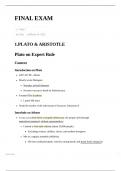FINAL EXAM
Topic
Date @March 24, 2023
1.PLATO & ARISTOTLE
Plato on Expert Rule
Context
Introduction on Plato
428?-347 BC, Athens
Mostly wrote Dialogues
Socrates, as lead character
Socrates was put to death by Athenian jury
Founded The Academy
Lasted 300 years
Would be teacher of the ruler/tyrant of Syracuse, Dionysius II
Interlude on Athens
It was a so-called direct or popular democracy: the people rule (through
majorities/consensus) without representatives
Limited to free male citizens (about 30,000 people)
Excluding women, children, slaves, and resident foreigners
Met in a regular assembly (ekklēsia).
All men could participate, vote (by raising hand), and speak freely (isegoria)
FINAL EXAM 1
, The poor subsidized to participate from imperial income
For important matters (e.g., war) there was the boulē or council, which was composed
of 500 citizens who were chosen by lot (sortition) and served for one year
Many magistrates and offices were also chosen by lot.
Mix between democratic and sortitions elements; ultimately the power was the
people’s
The council (a) set the agenda for the assembly (b) oversaw the Athenian bureaucracy;
(c) was the main jury/judges in trials.
Because ruling, law giving, judging are not separated, Athens is an unified/unitary
state
cf. Separation of powers (Polybius [200 –118 BC]; Montesquieu [1689-1755]) De
l'esprit des lois, (and Locke!)
Fifth and Fourth Century Athens
492-449: Leading part of coalition (with Sparta) in the wars that defeated Persians
Athens controlled the navy
478ff: Athens became leader of Delian league (Perikles)
Voluntary, but it became a de facto Athenian empire
Either the islands gave them ships or paid them silver
The junior partners paid tribute to Athens → Used to subsidize poor & build
temples
431–404: Peloponnesian War
Plague & defeat for Athens
404/3: Thirty Tyrants - Client regime
Led by Critias (a student of Socrates)
399 Socrates convicted to death after return of democracy
338: Athens defeated by Philip 1
The Ship of State (Analogy)
FINAL EXAM 2
, [1] The sailors are quarreling among themselves over captaincy of the ship, [2] each one
thinking that he ought to be captain, [3] though he has never learned that skill...[4] On top of
which they say it cannot be taught. In fact, [5] they’re prepared to cut to pieces anyone who
says it can....[6] They beg him [the ship-owner] and do everything they can to make him
hand over the tiller to them. [6*] Sometimes, if other people can persuade him and they
cannot, they kill those others or throw them overboard. [7] Then they immobilize their
worthy [stronger, but not too clever] ship-owner with drugs or drinks or by some other
means, and take control of the ship, helping themselves to what it is carrying. [8] Drinking
and feasting they sail. [9] If someone is good at finding them ways of persuading or
compelling the ship-owner to let them take control, [10] they call him a real seaman, a real
captain, and say he really knows about ships
Some interpretive decisions
In a democracy the ship-owner = the people
So, the unruly sailors are ambitious politicians (generally drawn from upper-classes
[elites] - Machiavelli calls these the ‘grandi’)
At least 10 Platonic criticisms of popular democracy
1. Democracy → dissensus
2. Self-rule generates overconfidence
3. Most ambitious would-be-rulers lack expertise, are incompetent
4. And deny the very existence of political expertise
5. They threaten or kill anybody who claims intellectual superiority, they are dangerous
6. The desire of the ambitious to rule generates →
[6*] murderous conflict
7. The elites incite (oligarchic) revolutions to steal property
8. With demagogues in control there is much rudderless pleasure, irresponsible celebrations
9. The people are susceptible to flattery and demagogues
10. The masses call demagogues ‘skilled’
Some evaluative comments
FINAL EXAM 3
, On [1]: direct democracy generates dissensus because everybody can have a say and
[1&6] the ambitious, who hope to rule, will use flattery of the people in order to enrich
themselves.
That everyone wants to be in control is implausible.
Even so, all Socrates needs for the analogy to work is that rich people want to be in
control (seems plausible).
As an aside: Plato thinks that the practice of direct democracy reveal the (undesirable)
fact of value-pluralism.
Value pluralism = existence of conflicting and incompatible values.
The consequence of:
Diversity and inconstancy of human emotions and desires
The lack of regulation of our emotions and desires in a free country like
Athens
Heterogeneous socialization of Athens
By contrast, Weber thinks value-pluralism is a product of modernity, especially
advanced division of labor.
On [2] that self-rule always generates overconfidence in all the would be rulers, is
probably too strong. There are risk averse people.
But that rich and successful people when ruling, without external constraint (other
states' power, etc.) are overconfident is not implausible. Plato would have been able
to point to the disastrous expedition of Athenians to Syracuse as evidence of rulers
attacking just because it is available
On [5] ‘They threaten/kill anybody who claims intellectual superiority’ Plato could
point to the trial and execution of his mentor, Socrates.
Friends of direct democracy might argue that the case of Socrates was the exception
rather than the rule.
On [6* & 7] much of the history of Greece, as relayed by Herodotus and Thucydides,
suggests an eternal return of local civil wars among the rich and poor.
Direct democracies are inherently unstable
FINAL EXAM 4




